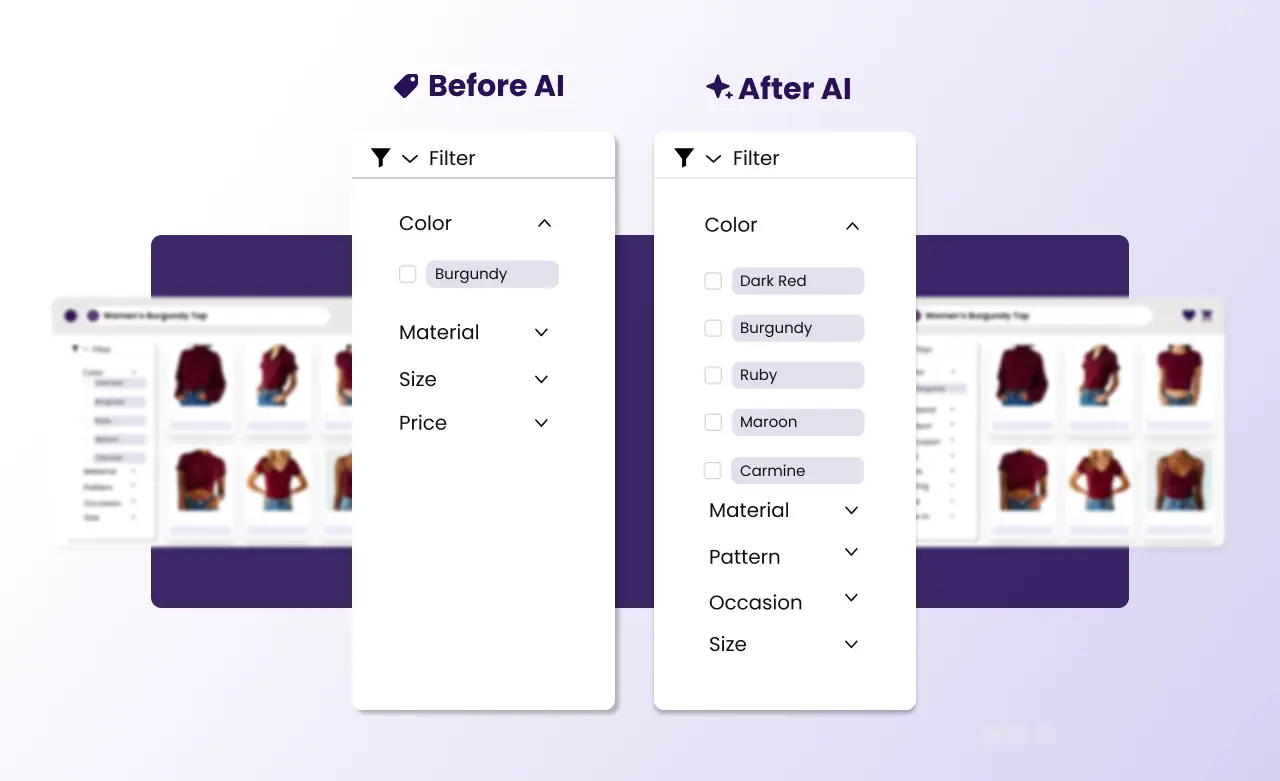
If you manage product catalogs from multiple brands, you know how challenging it is to keep your product data consistent. Different brands use different naming, categories, and attribute formats, making your catalog fragmented and confusing for shoppers.
In fact, 68.3%% of consumers abandon a purchase in the fashion and clothing industry. And one of the major reasons is incomplete or inaccurate product information. This lack of product data standardization hurts search, filtering, SEO, and operations. All of these issues directly impact sales and conversions, and fixing them manually does not scale.
That is why many retailers turn to AI for product data cleanup and automated product data enrichment to unify product information faster and more accurately.
Why Managing Multi-Brand Catalogs Is So Complex
When you sell products from multiple brands, each brings its own unique way of describing and organizing items. This creates several challenges:
Inconsistent naming conventions
Brands often use different terms for the same attribute, such as “navy blue” versus “deep blue” or “slim fit” versus “tailored fit.” This inconsistency makes standardizing product attributes difficult and breaks the reliability of filters and comparisons across your catalog.
Varying product categories and taxonomies
One brand might list a dress under “women’s casual wear,” while another places it in “evening wear.” Without product taxonomy standardization, customers face a fragmented shopping experience.
Diverse attribute formats and standards
Sizes may be labeled as “M,” “Medium,” or numerical measurements depending on the brand. Materials might be described differently or left out entirely. These inconsistencies reduce product feed consistency and impair product metadata management.
Missing or incomplete product information
Some brands omit important details like fabric type or care instructions, making product listings less informative and harder to search.
These issues cause several operational and customer-facing problems:
- Confusing or broken product filters: Shoppers struggle to narrow down options because filter terms don’t align across brands, hurting product discoverability.
- Poor search results and reduced visibility: Inconsistent and incomplete metadata negatively affects SEO and onsite search performance, reducing overall eCommerce product data harmonization.
- Time-consuming manual cleanup: Teams waste hours trying to fix inconsistent data through manual processes, slowing down growth and reducing efficiency in retail data normalization.
- Difficulty managing seasonal and limited-edition collections: Manually listing seasonal or limited-edition products quickly and accurately is challenging during peak times. Without standardized data and automation, launching collections under tight timelines becomes difficult.
How AI Enables Product Data Standardization at Scale
Managing product data from multiple brands can be overwhelming because each brand uses different names, categories, and formats for their products. AI-powered tools can automate and simplify this process, making your catalog more accurate and easier to navigate.
Here’s what AI can do for you:
- Automatically categorize products by using AI product tagging to assign detailed and consistent tags based on product images. This makes it easier to organize items into unified categories and improves filtering and search across your catalog, supporting efficient automated product categorization. It’s especially useful for quickly handling seasonal or limited-edition collections, where speed and accuracy matter most.
- Standardize product attributes such as color, size, and material so that filters work smoothly and shoppers get reliable results. This also helps keep your product listings uniform across brands, enabling effective product data standardization. For example, solutions like Pixyle use a fashion-specific taxonomy to enrich and harmonize product data automatically.
- Generate missing product information using AI to automatically create product titles and descriptions. These can be tailored to follow your brand’s tone, structure, and formatting rules, ensuring consistency across your catalog. This not only saves time but also enhances product metadata management, making product listings more complete and easier for shoppers to understand.
- Automating data management through AI product data enrichment and standardization reduces manual work and saves time on repetitive tasks. This frees up teams to focus on higher-value initiatives like strategy and growth. It also leads to more consistent product feeds and easier multi-brand catalog management, which improves the shopper experience by making product discovery smoother.
These AI-driven workflows are especially useful for teams managing high volumes, supporting eCommerce product data scalability without sacrificing accuracy or speed.
Benefits for Retailers and Shoppers
Automating multi-brand product data standardization with AI delivers multiple benefits:
- Improved product discoverability thanks to harmonized attributes and better filters, helping shoppers find what they want faster
- Faster time-to-market as new products from multiple brands can be onboarded quickly without manual rework
- Increased sales conversion through clearer, more accurate product information that builds shopper confidence
- Reduced operational costs by minimizing manual data cleanup and standardization efforts
- Scalability and flexibility to handle evolving product ranges and new brands without disrupting data consistency
By using AI tools for standardizing retail product attributes, businesses can keep up with fast-moving inventory changes while maintaining consistent and searchable listings.
Automating Multi-Brand Product Data Standardization with AI: A Retail Success Story
Otrium, an online fashion outlet managing multiple premium brands, faced challenges with manual tagging that was slow, prone to mistakes, and limited in detail. These problems affected product discoverability and made multi-brand catalog management difficult. By using Pixyle’s AI-powered automatic tagging, Otrium improved the quality and consistency of their product data.
Key results included:
- 90% increase in overall productivity
- 95% improvement in search results for specific terms
- 10x faster time to market
This AI-driven approach helped Otrium handle their multi-brand catalog more efficiently and offer shoppers a better experience.
Ready to Stop Drowning in Dirty Data?
Managing product catalogs from multiple brands doesn’t have to feel like herding digital cats. With Pixyle.ai, you can clean up messy product data, unify your attributes, and scale your catalog without sacrificing accuracy, speed, or sanity.
Whether you're onboarding thousands of SKUs or launching seasonal collections on the fly, Pixyle’s AI does the heavy lifting: automatically tagging, standardizing, and enriching your product listings with precision.
Want cleaner data, faster launches, and smarter product discovery?
It’s time to let Pixyle AI bring order to your retail chaos.
Explore how Pixyle.ai can transform your product data today.
Boost your sales with AI product tagging
Optimize your eCommerce catalog to improve discovery and conversions.






